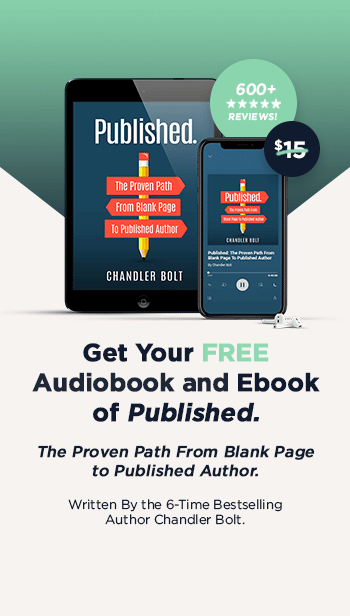The audiobook industry is quickly growing, yet it can seem daunting to authors unfamiliar with the process.
For the past couple of years, I have slowly been turning my repertoire of 50+ works of fiction into audiobooks. I have encountered many roadblocks, from managing flaky narrators to choosing a payment model.
I just finished the production of my 27th audiobook Heart of Gold, which has been a breeze, but it wasn’t always this easy.
If you’re considering turning your work into a self-published audiobook, follow these 10 steps.
1. Determine if the audiobook industry is right for you
The audiobook market is growing, but is it worth it for you as a writer?
Frankly, audiobooks are time consuming — it’s like re-writing your novel. All the hours that go into production and editing can be costly, so you must decide if the audiobook market will be lucrative enough for your books.
This is a personal decision a writer must make by considering a multitude of factors.
Ask yourself these questions: Do I have the time to put into this project? Do I see my novels doing well as audiobooks? Will my fan base be receptive to this new platform?
2. Find your perfect narrator
Easier said than done!
It’s imperative that the narrator you select fits your book because he or she will be telling your story. The voice actor should represent the tone of your characters.
If your book is in first person, the narrator should represent that specific character. Think about how their voice should sound: female or male, sultry or raspy? Make sure you carefully choose because the narrator can make or break a novel.
For my novel Mother Nile, I chose an engaging narrator with a British accent because of his worldly and sophisticated voice. He also just happens to be familiar with the pronunciation of many Arabic words, making him the perfect match for my book, which partially takes place during Britain’s occupation in Egypt.
For those who aren’t writing fiction, but instead a memoir, then perhaps you’ll want to narrate your own book.
3. Correct your audio
This is one of the most time consuming parts of audiobook production because you must listen through your novel carefully.
I’ve come across sound glitches, narrator’s coughing and even the sound of dishes clanking in the background.
You have to mark the time stamp and let the narrator know there is a mistake they must correct.
4. Decide when enough is enough
Sometimes narrators can be difficult to work with; they may miss deadlines, they may make tons of mistakes and technical glitches throughout the narrative, etc.
Sometimes it’s better to drop them and look for a new narrator, as long as it doesn’t go against any contract.
I had originally chosen a different narrator for one of my books before I (thankfully) came across Colleen Crimmins. The original narrator missed lines and had many audio glitches in her work.
Unfortunately, we had to change narrators due to the quality of the work, but in exchange I got a great narrator who did a flawless job.
5. Pick which mistakes enhance your narrative
Audiobooks rely on sound rather than sight, so sometimes narrators will add a word or change a clause slightly because it “flows” better when spoken.
If it sounds fluid and normal, it is okay to let the ‘mistake’ go by, allowing the narrative to sound more colloquial.
As an added bonus, it also saves editing time.
6. Choose which platform you want to use
Depending on what you want to do with your book, you can use a service like ACX, a platform owned by Amazon, which takes a percentage of your sales.
There are so many platforms to use, so it’s all about which one suits your needs the best.
I use ACX because it’s a very convenient service that allows you to host narrator auditions, work with a narrator, proof the audiobook and publish it.
The entire production process can be done in one place, making it great for amateurs and pros.
7. Choose a payment model
The narrator is an imperative part of your audiobook, so it’s important to figure out how you and the narrator can benefit the most.
You can pay your narrator with a royalty share, which means you do not have to pay them up front; they essentially produce the book for “free”, and when the book goes on sale, they receive a percentage of your sales.
You can pay per finished hour, which is almost like an hourly wage, but once the production process is over, you don’t have to pay the narrator anything more.
If you choose royalty share on ACX, (and of course the narrator agrees to that payment method) your audiobook will be exclusive to Audible for three years.
Depending on what platform you use, one method might be better than the other, just make sure you read the fine print on whichever production platform you use.
8. Make time to review your audiobook
The average audiobook takes about eight hours to listen to, but many of mine run much longer.
You’ll also have to go over the audio a few times, adding time to your production. Every time you send in mistakes and the narrator “corrects” them, you’ll have to go back and listen to make sure everything is good to go.
I have a great team of employees who help me go through the audio, so I can work on writing my novels and articles instead. Not every self published author has this luxury, so ask yourself whether it’s worth outsourcing the labor, which adds to your production costs, or doing it yourself, which is time intensive.
9. Promote your audiobook
Sometimes authors overlook the importance of branding and promoting in this day and age.
It’s imperative that you spend time marketing your book, whether you’re making eye-catching Facebook posts or giving out promotional copies of your book.
For audiobooks, it’s important to find audiobook enthusiasts who will honestly review your book.
If they leave genuinely good reviews on sites like Audible or Goodreads, potential readers will become more inclined to purchase your hard work. Giveaways can also spread the word about your audiobook and generate honest reviews.
10. Evaluate the process
Now you must look back at the process and reflect upon it.
There is one major question you must ask yourself: Were you successful?
Was the production process worth the hassle? Did you have trouble with the narrator? Were your audiobook sales good? You must ask yourself all these questions and decide if the end result was worth all the time and toil.
It took a lot of trial and error to realize all of these struggles are a normal part of the production process, so now I keep all of these points in mind when I begin producing a new audiobook.
Pursuing audiobooks might be daunting at first, but there are plenty of resources that can help.
To learn how to self-publish your audiobook, ebook, and paperback, check out Chandler Bolt’s bestselling book, Published. The Proven Path from Blank Page to 10,000 Copies Sold. It has over 1,000 5-star reviews.
Are you thinking about producing an audiobook? Let us know in the comments.
This post contains affiliate links. That means if you purchase through our links, you’re supporting The Write Life — and we thank you for that!
Photo via Gavin Whitner








